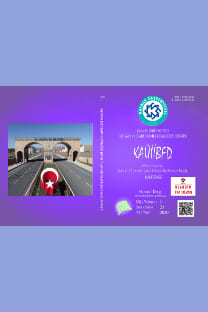KAYNAK TÜKETİM MUHASEBESİ: BİR ÖZEL EĞİTİM KURUMUNDA UYGULAMA
Bu çalışma, örnek bir uygulama üzerinden işletmelerin katlandığı maliyetlerin Kaynak Tüketim Muhasebesi (KTM) Yöntemi ile hesaplanması ve KTM’nin Faaliyet Tabanlı Maliyetleme (FTM) Yöntemine göre farklılıklarının belirlenmesini amaçlamaktadır. Bu amaçla TRA2 Bölgesinde eğitim hizmetleri veren bir özel eğitim kurumunda vaka çalışması yapılmıştır. Çalışmanın kaynaklarını birincil ve ikincil veriler oluşturmaktadır. Birincil veriler özel eğitim kurumundaki direkt gözlemler ve personel ile görüşmeler sonucu elde edilmiş, ikincil veriler ise literatürdeki çeşitli kaynaklardan sağlanmıştır. Uygulama sonucunda, KTM ile yapılan hesaplamalar, KTM’nin hem daha doğru maliyet bilgisine ulaşma hem de maliyetlerin analiz edilmesi ve sonuçların değerlendirilmesi açısından FTM’den daha iyi sonuçlar ortaya koyduğunu göstermiştir.
Anahtar Kelimeler:
Yönetim Muhasebesi, Kaynak Tüketim Muhasebesi, Faaliyet Tabanlı Maliyetleme
RESOURCE CONSUMPTION ACCOUNTING: CASE STUDY IN A PRIVATE EDUCATIONAL INSTITUTION
The aim of this study is to calculate the costs incurred by the enterprises using the Resource Consumption Accounting (RCA) Method and to determine the differences of RCA from the Activity Based Costing (ABC) Method. For this purpose, a case study was conducted in a private school providing education services in the TRA2 Region. Primary and secondary data are the sources of the study. Primary data were obtained through direct observations in the private school and interviews with the staff, while secondary data were obtained from various sources in the literature. As a result of the application, calculations made with RCA showed that RCA reaches more accurate cost information and analyzes the costs and evaluates the results better than ABC.
___
- Aksu, İ. (2013). Kaynak Tüketimine Dayalı Muhasebe: Bir Örnek Uygulama. Social Sciences, 8(4), 165-182. doi:10.12739/NWSA.2013.8.4.3C0116.
- Balakrishnan, R., Labro, E., & Sivaramakrishnan, K. (2012). Product Costs as Decision Aids: An Analysis of Alternative Approaches (Part 1). Accounting Horizons, 26(1), 1-20.
- Clinton, B. D., & Webber, S. A. (2004, Ekim). RCA at Clopay: Here's innovation in management accounting with Resource Consumption Accounting. Strategic Finance, 21-26.
- Garg, A., Ghosh, D., Hudick, J., & Nowacki, C. (2003, Temmuz). Roles and Practices in Management Accounting Today . Strategic Finance, 1-6.
- Karaca, N., & Küçük, H. (2017). Kaynak Tüketim Muhasebesi Temelinde Ürün Maliyetlerinin Hesaplanması-Karşılaştırmalı bir Uygulama. İşletme Araştırmaları Dergisi, 9(2), 353-375.
- Kayıhan, B., & Tepeli, Y. (2016). Yeni Bir Maliyetleme Tekniği Olarak Kaynak Tüketim Muhasebesi ve Bir Örnek Uygulama. Uluslararası Yönetim İktisat ve İşletme Dergisi(ICAFR 16 Özel Sayısı), 431-443.
- Okutmuş, E. (2015). Resource Consumption Accounting with Cost Dimension and an Application in a Glass Factory. International Journal of Academic Research in Accounting, Finance and Management Sciences, 5(1), 46-57. doi:10.6007/IJARAFMS/v5-i1/1458.
- Perkins, D., & Stovall, O. (2011). Resource Consumption Accounting – Where Does It Fit? The Journal of Applied Business Research, 27(5), 41-52. doi:10.19030/jabr.v27i5.5591.
- Sharman, P., & Vikas, K. (2004, Aralık). Lessons from German Cost Accounting. Strategic Finance, 28-35.
- Tse, M. S., & Gong, M. Z. (2009). Recognition of Idle Resources in Time-Driven Activity-Based Costing and Resource Consumption Accounting Models. Journal of Applied Management Accounting Research, 7(2), 41-54.
- Tunç, K., & Şafak, A. (2015). Kaynak Tüketim Muhasebesinde Kapasite Maliyet Yönetimi. Muhasebe ve Denetime Bakış, 15(45), 51-74.
- Webber, S., & Clinton, D. (2004). Resource Consumption Accounting Applied: The Clopay Case. Management Accounting Quarterly, 6(1), 1-14.
- White, L. (2009). Resource Consumption Accounting: Manager-Focused Management Accounting. The Journal of Corporate Accounting & Finance, 20(4), 63-77. doi:10.1002/jcaf.20501.
- ISSN: 1309-4289
- Yayın Aralığı: Yılda 2 Sayı
- Başlangıç: 2010
- Yayıncı: Kafkas Üniversitesi, İktisadi ve İdari Bilimler Fakültesi
Sayıdaki Diğer Makaleler
MOBİL UYGULAMA KULLANIMININ BENİMSENMESİ: TEKNOLOJİ KABUL MODELİ İLE BİR ÇALIŞMA
Süleyman Can YILDIRIR, Burçin KAPLAN
ALTERNATİF PARA POLİTİKASI ARAYIŞLARI; NEGATİF FAİZ ORANI POLİTİKASI
İSMAİL CEM ÖZKURT, LEVENT ÖZŞAHİN
TURKISH BANKING SECTOR PERFORMANCE ANALYSES
Gizay DAVER, GÜRAY KÜÇÜKKOCAOĞLU
Gürcan PAPATYA, Mehmet Nedim UYGUR
TÜKETİM FONKSİYONU VE TÜKETİCİ GÜVEN ENDEKSİ
RAHMİ YAMAK, NEBİYE YAMAK, Ece ERKAN
İŞLETMELERİN AR-GE VE PAZARLAMA HARCAMALARININ PAY DEĞERİ ÜZERİNDEKİ ETKİSİ
BÖLGESEL AVANTAJ YARATMAK İÇİN KÜRESEL BİR STRATEJİ BÖLGESEL YENİLİK SİSTEMLERİ (BYS)
Selen IŞIK MADEN, Ayşegül BAYKUL
A "Global" Strategy on Constructing "Regional" Advantage By RIS
